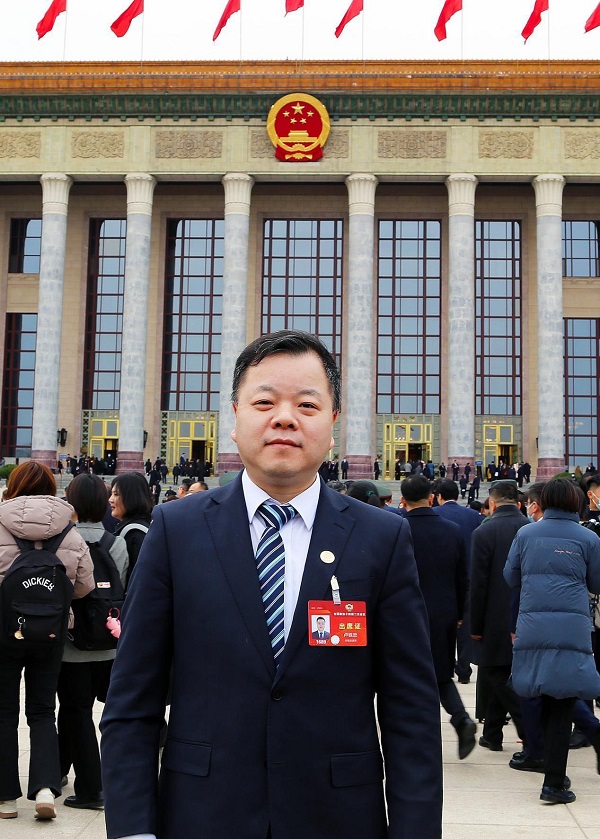Political advisor Lu Tiezhong calls for open innovation in global nuclear sector
Political advisor Lu Tiezhong calls for open innovation in global nuclear sector.

CPPCC member Lu Tiezhong, also chairman of China National Nuclear Power Co., Ltd. [Photo provided to China.org.cn]
The government work report, released at the annual gathering of the country's top legislature in Beijing on Tuesday, added "ensuring energy and resource security" and "accelerating the development of a new energy system" to the government's to-do list this year.
Lu Tiezhong, a member of the Chinese People's Political Consultative Conference (CPPCC) National Committee, the country's top political advisory body, and chairman of China National Nuclear Power Co., Ltd. (CNNP), shared his insights on these objectives with China.org.cn.
CNNP is committed to enhancing national energy security through independent innovation, according to Lu. He highlighted the company's efforts to take more concrete actions towards promoting the high-level opening-up of the nuclear energy industry, thus contributing to the global development of nuclear energy.
Nuclear energy is recognized as a safe, cost-effective and efficient source of clean energy. Amid global carbon constraints, nuclear power is becoming an important means to achieve carbon reduction and neutrality worldwide. Lu stated that the development of nuclear power is a vital step for China's sustainable socio-economic progress, fulfilling the people's aspirations for a better life and attaining the country's "dual carbon" goals.
The China Nuclear Energy Association forecasts that by 2060, the country aims to build 400 million kilowatts of nuclear power capacity, making up approximately 18% of its total electricity generation. This projection aligns with the average level in developed countries.
However, the current mechanisms for green electricity, green certificates, and carbon emission rights trading have yet to fully acknowledge and define nuclear energy's green and low-carbon value. Lu suggested that the country take the lead in recognizing the green attributes of nuclear energy and further integrate nuclear power into China's green and low-carbon policy system to help promote the country's high-quality development.
Energy is the foundation of modern societal development and economic operations. Lu said that CNNP is committed to ensuring energy security by continually improving safety technical standards and management practices, thereby providing a reliable, sustainable energy supply.
At the same time, CNNP has steadfastly pursued a path of independent innovation, achieving numerous major breakthroughs.
Possessing a "whole industry chain" advantage, China National Nuclear Corporation (CNNC) has mastered the construction, operation, and maintenance technologies for major nuclear power plants worldwide. It independently developed and exported the third-generation nuclear power technology unit, "Hualong-1," establishing its own nuclear power brand and gaining extensive project management and construction experience both domestically and internationally. Looking ahead, CNNP will continue to embrace innovation and development, aiming to build strategic emerging industries.
In the context of the global clean energy transition, there has been a growing demand for nuclear energy in the international market. Lu noted that CNNC has consistently adhered to the principles of mutual respect and benefit, working collaboratively with global partners, actively engaging in global energy governance, enhancing experience sharing, supporting the global energy transition and sustainable development, and contributing more Chinese technologies, products and solutions to the world.
Currently, CNNC is continuously strengthening and expanding its "international wing" by establishing and improving an open innovation system that aligns with international standards. First, CNNC conducts in-depth exchanges and cooperation with international nuclear organizations, such as the International Atomic Energy Agency, the OECD Nuclear Energy Agency and the Generation IV International Forum. This has maximized the potential of CNNC's overseas research and development institutions and created hubs for overseas high-end talent.
In addition, CNNC continues to promote comprehensive cooperation with long-standing partners like Russia and France, while also broadening its collaboration with new partners and planning to establish a research and development center in Eastern Europe. CNNC continues to increase the participation of international scientific and technological talents in the group's scientific research tasks and project implementation.
Lu pointed out that CNNC is vigorously pursuing the Belt and Road Initiative and accelerating its expansion into international markets. The company has already established cooperative relationships with more than 60 countries and regions worldwide. Concurrently, CNNC is collaborating with Pakistan, Argentina, Saudi Arabia, the United Arab Emirates, Kazakhstan and other countries and regions to promote nuclear energy projects and is committed to building model projects for the Belt and Road Initiative.
CNNC plans to take more proactive steps to promote a high-level opening to the global community, endeavoring to build a collaborative platform for the innovation and development of global nuclear energy. Lu added that this would significantly contribute to the peaceful use of nuclear energy and its advanced development.
- China Institute of Atomic Energy
- Nuclear Power Institute of China
- Southwestern Institute of Physics
- China Nuclear Power Operation Technology Corporation, Ltd.
- China Nuclear Power Engineering Co., Ltd.
- China Institute for Radiation Protection
- Beijing Research Institute of Uranium Geology (BRIUG)
- China Institute of Nuclear Industry Strategy (CINIS)
- China Nuclear Mining Science and Technology Corporation


